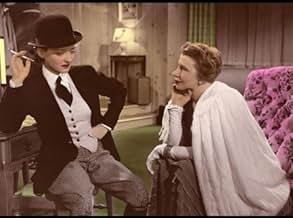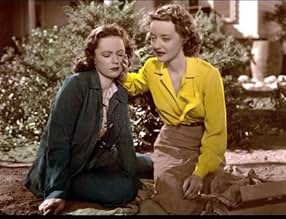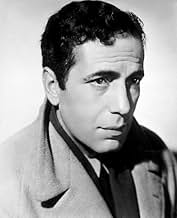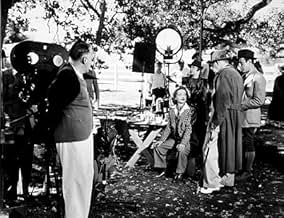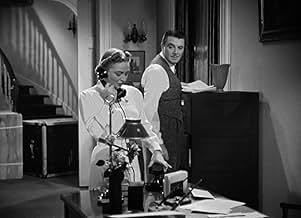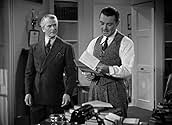AVALIAÇÃO DA IMDb
7,4/10
13 mil
SUA AVALIAÇÃO
Uma jovem socialite é diagnosticada com um tumor cerebral inoperável, e deve decidir se viverá ou não seus últimos dias com dignidade.Uma jovem socialite é diagnosticada com um tumor cerebral inoperável, e deve decidir se viverá ou não seus últimos dias com dignidade.Uma jovem socialite é diagnosticada com um tumor cerebral inoperável, e deve decidir se viverá ou não seus últimos dias com dignidade.
- Direção
- Roteiristas
- Artistas
- Indicado a 3 Oscars
- 5 vitórias e 4 indicações no total
Black Ace
- Judith's Horse
- (não creditado)
Marian Alden
- Judith's Friend
- (não creditado)
Wilda Bennett
- Judith's Friend
- (não creditado)
Diane Bernard
- Lucy - a Servant
- (não creditado)
- Direção
- Roteiristas
- Elenco e equipe completos
- Produção, bilheteria e muito mais no IMDbPro
Avaliações em destaque
"Dark Victory" features a superb performance by Bette Davis, portraying Judy Traherne, a socialite struggling to come to terms with terminal brain cancer, a diagnosis that ironically brings her the greatest joy of her life, as she falls in love with and marries the doctor who diagnosed her, also superbly played by George Brent.
There's nothing really to dislike in this movie. The basic point is simple to figure out: whatever darkness you may face, make the best of it and live life to the fullest, because even in darkness there may be victory. The supporting cast is tremendous, particularly Geraldine Fitzgerald as Ann King, Judy's friend and assistant who helps her through this bewildering time of conflicting emotions. The movie is not exactly filled with suspense and there's no dramatic death scene, but the emotion is raw all the way through, and the sympathy the viewer feels for this couple who are so much in love but have so little time to enjoy it is very real.
This is very well done, and well worth a look see. I would rate it as a 7/10.
There's nothing really to dislike in this movie. The basic point is simple to figure out: whatever darkness you may face, make the best of it and live life to the fullest, because even in darkness there may be victory. The supporting cast is tremendous, particularly Geraldine Fitzgerald as Ann King, Judy's friend and assistant who helps her through this bewildering time of conflicting emotions. The movie is not exactly filled with suspense and there's no dramatic death scene, but the emotion is raw all the way through, and the sympathy the viewer feels for this couple who are so much in love but have so little time to enjoy it is very real.
This is very well done, and well worth a look see. I would rate it as a 7/10.
You've been feeling somewhat ill, and just not with it, your vision gets quite blurred, but you admit it, so it's off to see the doc, though you're in for quite a shock, an operation is required to get you fit. You start to mend, but there's something new you feel, seems you've fallen for the man who's made you heal, emotions at a high, but there are things you've been denied, then indiscretion leads you to a big reveal.
There's some racy dialogue to contend with, but the performances of both Bette Davis and George Brent are divine, in what is not your typical boy meets girl story of the time. You also get the added bonus of Humphry Bogart, although his Irish brogue would never earn him any rewards, and a future President provides some small support.
A film of its time but plenty to enjoy still today.
There's some racy dialogue to contend with, but the performances of both Bette Davis and George Brent are divine, in what is not your typical boy meets girl story of the time. You also get the added bonus of Humphry Bogart, although his Irish brogue would never earn him any rewards, and a future President provides some small support.
A film of its time but plenty to enjoy still today.
When Bette Davis was in ball buster mode, watch out!! But when she decided to suffer nobly, she could suffer with the best of them.
In "Dark Victory," Davis plays a woman dying from the deadliest of deadly diseases---the vague, unnamed illness that beautiful actresses died of in movies from the 1930s. The symptoms never seem to be the same, but they're always tear-inducing. Here, they make Davis go blind and we know when the disease is getting worse because a fuzzy black halo begins to appear around the edges of the frame.
Actually, this movie is a rather pale companion to the ultimate Davis melodrama, "Now, Voyager." But it has perhaps my favorite line ever delivered in a Bette Davis movie. She's found out that her illness is fatal, and she's at dinner with the doctor who has kept this from her to protect her fragile soul. When the waiter comes to take her order, she says, "How about a nice big helping of..." pause, as she throws the most withering of withering stares at her companion ..."prognosis negative." That should really be on a bumper sticker somewhere.
As for the other actors.....wait, other actors? No one watches a Bette Davis movie to see other actors. I'm not even sure there were any other actors in this movie.
Grade: B
In "Dark Victory," Davis plays a woman dying from the deadliest of deadly diseases---the vague, unnamed illness that beautiful actresses died of in movies from the 1930s. The symptoms never seem to be the same, but they're always tear-inducing. Here, they make Davis go blind and we know when the disease is getting worse because a fuzzy black halo begins to appear around the edges of the frame.
Actually, this movie is a rather pale companion to the ultimate Davis melodrama, "Now, Voyager." But it has perhaps my favorite line ever delivered in a Bette Davis movie. She's found out that her illness is fatal, and she's at dinner with the doctor who has kept this from her to protect her fragile soul. When the waiter comes to take her order, she says, "How about a nice big helping of..." pause, as she throws the most withering of withering stares at her companion ..."prognosis negative." That should really be on a bumper sticker somewhere.
As for the other actors.....wait, other actors? No one watches a Bette Davis movie to see other actors. I'm not even sure there were any other actors in this movie.
Grade: B
I was probably 12 years old when I first saw this film on TV. It was shown in two parts and I didn't get to see the second part, so my mother had to tell me what happened.
Forty years later, I still cry every time I see "Dark Victory." It remains one of my favorite films for sheer use of Kleenex and my favorite Bette Davis movie, "All About Eve" being right up there with it. I even saw it on the big screen in a revival house when I was in college.
Yes, some of the dialogue sounds corny now, like the good doctor saying, "Women never meant anything to me before". But the interesting thing is, when I did see it with an audience, though they laughed as some inappropriate spots, by the end you could hear the sobs on the next block.
There have been comments that Humphrey Bogart seems miscast in a somewhat minor role. I frankly thought he was just fine. He certainly was short enough to be a jockey and he pulled off the brogue.
I'm sure it's confusing for some to see him in such a small role in 1939 when only a few years later, he was a total superstar. But he was under contract to Warners and kicked around for years before "High Sierra" and "Casablanca".
He obviously wasn't working when "Dark Victory" was cast, so why let him sit around taking a salary and do nothing?
And of course we have Ronald Reagan as a playboy. I actually find him delightful in this film. It called for charm and he had it.
In today's fast-paced world, there's nothing stronger than a message about time and our use of it. "Oh, give me time for tenderness...just give me time."
Like Bette's character, I want to hear that song again too, in many more viewings of "Dark Victory."
Forty years later, I still cry every time I see "Dark Victory." It remains one of my favorite films for sheer use of Kleenex and my favorite Bette Davis movie, "All About Eve" being right up there with it. I even saw it on the big screen in a revival house when I was in college.
Yes, some of the dialogue sounds corny now, like the good doctor saying, "Women never meant anything to me before". But the interesting thing is, when I did see it with an audience, though they laughed as some inappropriate spots, by the end you could hear the sobs on the next block.
There have been comments that Humphrey Bogart seems miscast in a somewhat minor role. I frankly thought he was just fine. He certainly was short enough to be a jockey and he pulled off the brogue.
I'm sure it's confusing for some to see him in such a small role in 1939 when only a few years later, he was a total superstar. But he was under contract to Warners and kicked around for years before "High Sierra" and "Casablanca".
He obviously wasn't working when "Dark Victory" was cast, so why let him sit around taking a salary and do nothing?
And of course we have Ronald Reagan as a playboy. I actually find him delightful in this film. It called for charm and he had it.
In today's fast-paced world, there's nothing stronger than a message about time and our use of it. "Oh, give me time for tenderness...just give me time."
Like Bette's character, I want to hear that song again too, in many more viewings of "Dark Victory."
It's easy to see why Bette Davis admired "Dark Victory" more so than any of her other star-vehicles--her Judith Traherne is the quintessential Bette Davis character: smart, sassy, nervously gay, a drinking pal to the guys and a best buddy to the girls. Traherne is without malice, a real chum, and Davis plays her with fluttery vitriol and upper-crust glee. Long Island society girl, ailing but still strong, falls wildly in love with her doctor...but how can he tell her that she has very little time left to live? The supporting cast is made up of some odd personalities: Geraldine Fitzgerald's dedicated girlfriend seems to have no life outside of Judith's world (and performs her gal-pal duties with a curious severity); Humphrey Bogart is an Irish stable-hand with a secret crush on Judith (she's tempted, but ultimately conveys to him the old 'don't touch' message); Ronald Reagan is a country club type, always in a tuxedo and at the bar; George Brent is the brilliant surgeon who loves Judith (but he's faster with his fists than he is with words). Based on a play by George Emerson Brewer, Jr. and Bertram Bloch (which had starred Tallulah Bankhead), this chatty Warner Bros. weeper is glossy and flossy, a dithering, overstated, swooning romantic mini-epic for masochists. In other words, the archetypal Bette Davis film. *** from ****
Você sabia?
- CuriosidadesOff-screen, Bette Davis suffered a nervous breakdown during filming as a result of her crumbling marriage to Harmon Nelson. Reportedly, producer Hal B. Wallis convinced Davis that she could benefit by using these real-life emotions of pain and loss to enhance the portrayal of her character. Meanwhile, Davis's marital problems didn't prevent her from embarking on an affair with co-star George Brent. Davis and Brent appeared in a total of 11 movies together.
- Erros de gravaçãoWhen the setting changes to Vermont towards the end of the film, there is snow on the ground and it is obviously winter. Yet most of the trees in front of the house still have leaves on them.
- Versões alternativasAlso available in computer-coloured version.
- ConexõesFeatured in Stars on Horseback (1943)
- Trilhas sonorasOH, GIVE ME TIME FOR TENDERNESS
(1939) (uncredited)
Music by Edmund Goulding
Lyrics by Elsie Janis
Sung by Vera Van
Principais escolhas
Faça login para avaliar e ver a lista de recomendações personalizadas
Detalhes
Bilheteria
- Faturamento bruto mundial
- US$ 345
- Tempo de duração
- 1 h 44 min(104 min)
- Cor
- Mixagem de som
- Proporção
- 1.37 : 1
Contribua para esta página
Sugerir uma alteração ou adicionar conteúdo ausente


